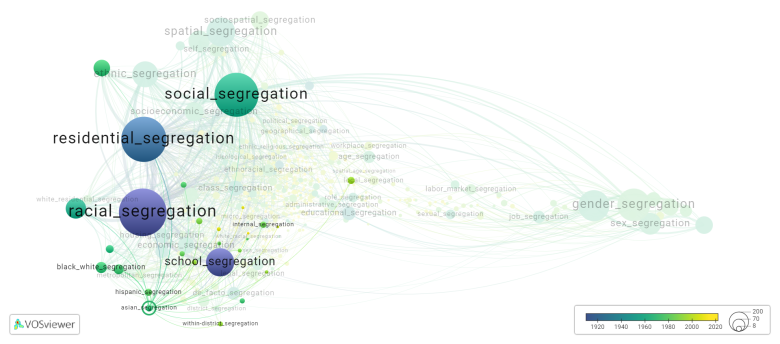Asian segregation: Difference between revisions
(Creating page) |
(Creating page) |
||
| (2 intermediate revisions by the same user not shown) | |||
| Line 18: | Line 18: | ||
[[File:asian_segregation.png|780x780px]] | [[File:asian_segregation.png|780x780px]] | ||
This visualization is based on the study [[Segregation_Wiki:About| The Multidisciplinary Landscape of Segregation Research]]. | |||
For the complete network of | For the complete network of interrelated segregation forms, please refer to: | ||
* [https://tinyurl.com/2235lkhw First year of publication] | |||
* [https://tinyurl.com/2d8wg5n3 Louvain clusters] | |||
* [https://tinyurl.com/223udk5r Betweenness centrality] | |||
* [https://tinyurl.com/244d8unz Disciplines in which segregation forms first emerged (Scopus database).] | |||
==References== | ==References== | ||
==Notes== | ==Notes== | ||
Latest revision as of 07:17, 16 October 2024
Date and country of first publication[1][edit | edit source]
1978
United Kingdom
Definition[edit | edit source]
Asian segregation refers to the practice of separating people of Asian descent from other racial or ethnic groups, often through the use of laws, policies, or social norms. This can manifest in various ways, such as assigning Asian individuals to certain neighborhoods, schools, or workplaces, or denying them access to certain facilities or resources.
Historically, Asian segregation has been a common practice in many parts of the world, including the United States, where Asian immigrants were often subjected to discriminatory laws and practices that limited their opportunities and confined them to certain areas of cities.
Today, while formal segregation based on race is illegal in many countries, there are still instances of informal segregation or discrimination against Asian individuals. This can manifest in the form of racial profiling, stereotyping, or exclusion from certain social or professional circles.
Efforts to combat Asian segregation include promoting diversity, equity, and inclusion initiatives, challenging stereotypes and biases, and advocating for policies that promote equal opportunities for all individuals, regardless of their racial or ethnic background.
See also[edit | edit source]
Related segregation forms[edit | edit source]
Asian segregation is frequently discussed in the literature with the following segregation forms:
black segregation, residential segregation, hispanic segregation, racial segregation, racial residential segregation, black anglo segregation, urban racial segregation, latino segregation, school segregation, suburban school segregation, suburban segregation, black white segregation, metropolitan residential segregation, african american segregation, white segregation, dichotomous segregation, multigroup segregation, social segregation, minority white segregation, ethnic residential segregation, black residential segregation, latino residential segregation

This visualization is based on the study The Multidisciplinary Landscape of Segregation Research.
For the complete network of interrelated segregation forms, please refer to:
References[edit | edit source]
Notes[edit | edit source]
- ↑ Date and country of first publication as informed by the Scopus database (December 2023).
At its current state, this definition has been generated by a Large Language Model (LLM) so far without review by an independent researcher or a member of the curating team of segregation experts that keep the Segregation Wiki online. While we strive for accuracy, we cannot guarantee its reliability, completeness and timeliness. Please use this content with caution and verify information as needed. Also, feel free to improve on the definition as you see fit, including the use of references and other informational resources. We value your input in enhancing the quality and accuracy of the definitions of segregation forms collectively offered in the Segregation Wiki ©.
Asian segregation appears in the following literature[edit | edit source]
McEvoy D. (1978). The segregation of Asian immigrants in glasgow: A note. Scottish Geographical Magazine, 94(3), 180-182. https://doi.org/10.1080/00369227808736406
Massey D.S., Denton N.A. (1987). Trends in the residential segregation of blacks, Hispanics, and Asians: 1970 1980. American Sociological Review, 52(6), 802-825. https://doi.org/10.2307/2095836
Nel E.L. (1991). Racial segregation in East London, 1836 1948. South African Geographical Journal, 73(2), 60-68. https://doi.org/10.1080/03736245.1991.9713550
Boyd R.L. (1991). Effects of relative group size, increase, and segregation on the earnings of blacks and asians. Sociological Focus, 24(3), 175-195. https://doi.org/10.1080/00380237.1991.10570589
Frey W.H., Farley R. (1996). Latino, Asian, and black segregation in U.S. metropolitan areas: Are multiethnic metros different?. Demography, 33(1), 35-50. Duke University Press.https://doi.org/10.2307/2061712
Reardon S.F., Yun J.T. (2001). Suburban racial change and suburban school segregation, 1987 95. Sociology of Education, 74(2), 79-101. American Sociological Association.https://doi.org/10.2307/2673164
Charles C.Z. (2003). The Dynamics of Racial Residential Segregation. Annual Review of Sociology, 29(), 167-207. https://doi.org/10.1146/annurev.soc.29.010202.100002
Iceland J. (2004). Beyond Black and White Metropolitan residential segregation in multi ethnic America. Social Science Research, 33(2), 248-271. Academic Press Inc..https://doi.org/10.1016/S0049-089X(03)00056-5
Logan J.R., Stults B.J., Farley R. (2004). Segration of minorities in the metropolis: Two decades of change. Demography, 41(1), 1-22. Duke University Press.https://doi.org/
Rugh J.S., Massey D.S. (201). Racial segregation and the American foreclosure crisis. American Sociological Review, 75(5), 629-651. https://doi.org/10.1177/0003122410380868
Hao L., Fong E. (2011). Linking dichotomous segregation with multi group segregation: Weighted segregation ratios in selected U.S. metropolitan areas. Social Science Research, 40(1), 379-391. https://doi.org/10.1016/j.ssresearch.2010.05.005
Rugh J.S., Massey D.S. (2013). Segregation in post civil rights America : Stalled integration or end of the segregated century?. Du Bois Review, 11(2), 205-232. Cambridge University Press.https://doi.org/10.1017/S1742058X13000180
De la Roca J., Ellen I.G., O'Regan K.M. (2014). Race and neighborhoods in the 21st century: What does segregation mean today?. Regional Science and Urban Economics, 47(1), 138-151. Elsevier.https://doi.org/10.1016/j.regsciurbeco.2013.09.006
Massey D.S., Tannen J. (2018). Suburbanization and segregation in the United States: 1970 2010. Ethnic and Racial Studies, 41(9), 1594-1611. Routledge.https://doi.org/10.1080/01419870.2017.1312010
Anderson K.F., Simburger D. (2022). Racial/Ethnic Residential Segregation, Poor Self rated Health, and the Moderating Role of Immigration. Race and Social Problems, 14(2), 131-149. Springer.https://doi.org/10.1007/s12552-021-09345-0
Crowell A., Fossett M. (2022). Metropolitan racial residential segregation in the United States: A microlevel and cross context analysis of Black, Latino, and Asian segregation. Demographic Research, 46(), 217-260. Max Planck Institute for Demographic Research.https://doi.org/10.4054/DEMRES.2022.46.8
